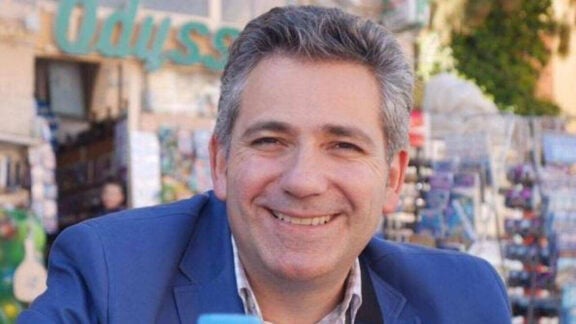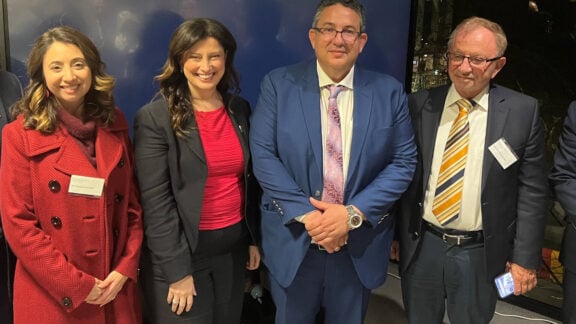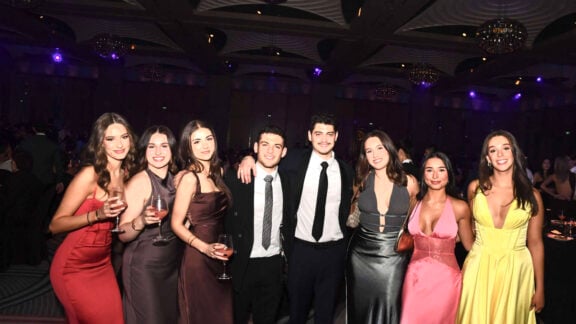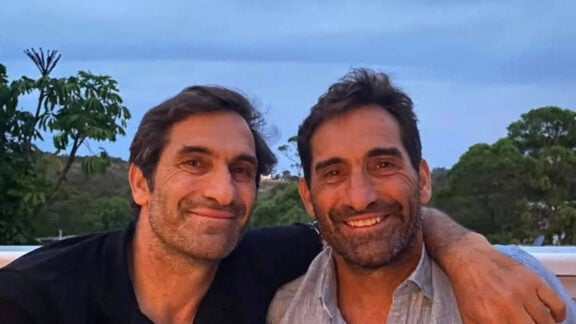“Daddy, do you speak Greek?”
My daughter just recently became aware that our family is bilingual. She’s three. She made the discovery when she was visited by one of her friends: an elderly lady who enjoys playing with her. My offspring asked for a story and brought a book to the woman who was confused by the illegible characters on the pages. “That’s all Greek to me”, she might have said. From then on, my three-year-old started making the distinction and added a new string of questions to the endless stream that seems to come out of her mouth.
“Is this book Greek? Does my teacher speak English? Can you sing to me in Greek? What is kamilopardali?”
“It means ‘giraffe’, darling”.
It is by pure coincidence that this new-found awareness came just in time for this year’s ‘Speak Greek in March’ campaign. It’s the only chance of her participating, singing the broken Greek versions of If You’re and You Know It and Twinkle Twinkle Little Star, before she retreats to her usual mode – answering in English to our questions delivered in Greek. I’m enjoying this while it lasts. Because I know what comes next. Boredom.
I’ve had many Greek language teachers report this to me, when describing the kids that come to the classes, sacrificing their afternoons and weekend mornings. “Greek school is boring. We only come because our parents make us”, is what they usually say.
They’re right, of course. School, by definition, is boring – not just language school, any school. Greek school, in particular can be a torment, a place where many poorly trained – and some totally unqualified – teachers preach about Greekness, spreading stale notions of motherland nostalgia, half-digested history and religious prejudice, teaching from questionable books (some filled with grammatical and spelling errors), and often openly dismissing current educational approaches, as inferior to the ways of the Greek education system. Who would want to learn anything under these conditions, let alone a complex and difficult language?
So yes, it’s a common secret that the majority of children are not really keen in attending Greek school. It takes driven parents and inspired teachers to take them out of this state and help them navigate through language. Most of all, it takes incentive – for everybody involved. I’ve spoken to many second- and third-generation Australians (some who did not hate Greek school), and even those who actually loved learning Greek and are fluent in it admit that they mostly did it to be able to communicate with their grandparents. This is not nearly enough. This attitude reduces Greek to a difficult communication tool with an ageing population – it is a recipe for defeat. It should be much more than that. It should be viewed as something that empowers a person and adds to their set of skills and qualifications. Because that’s what it is.
Science has proven that being bilingual adds to a child’s cognitive and social development, and is a factor that allows them to show significant problem-solving skills growing up. Furthermore, learning languages is among the best educational investments one may make.
As someone who grew up in middle-class Athens, I know it all too well. Learning languages after school was the norm and it accounts for the well-reported ‘brain drain’ that saw many of us leave our crisis-ridden homeland to make a living in Germany, UK, Canada, and Australia.
When all this difficulty ends – and someday, hopefully in the next few decades, it will – there will be many opportunities in Greece and knowing the language will be an asset, the way knowing German, Spanish, or Mandarin is a professional development tool.
But to achieve all this, we may need to rethink our language and what it signifies. Set it free of our cultural burdens and our anxious quest to not lose connection to the Greek ways.
Teach it as a game, through stories and cartoons and whatever might make it appealing to children. Deliver it from the grasp of religious teachings. Associate it with the beautiful works of literature and philosophy it has been producing for centuries. Teach it as a way to open oneself to the world, instead of a way of attachment to a close-knit community.
Let’s leave children outside our cultural identity worries and politics. And more importantly, lead by example.
If we read Greek books, if we show how much we value and enjoy our own bilingual status, maybe we can inspire them – and make specific language preservation campaigns redundant.







